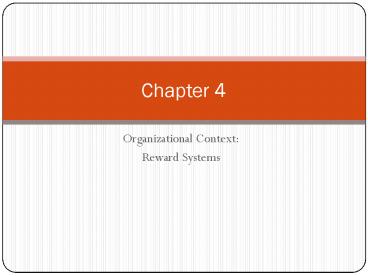Organizational Context: - PowerPoint PPT Presentation
1 / 17
Title:
Organizational Context:
Description:
Discuss the theoretical background on money as a reward. ... Hourly, weekly, monthly or annual basis. Labor Market Driven (Continued) Pay: The Dominant ... – PowerPoint PPT presentation
Number of Views:158
Avg rating:2.0/5.0
Title: Organizational Context:
1
Chapter 4
- Organizational Context
- Reward Systems
2
- If you must have motivation, think of your
paycheck on Friday.
3
Learning Objectives
- Discuss the theoretical background on money as a
reward. - Present the latest research on the effectiveness
of pay. - Describe some of the traditional methods of
administering pay. - Relate some of the latest forms of new pay and
their value in helping attract and retain
talented employees. - Explain how recognition is used as an
organizational reward. - Discuss the role of benefits as organizational
rewards.
4
The Theory Behind Pay for Performance
- Behavioral Modification
- Behavior is a function its consequence
- Reinforcing desired behaviors
- Extinguishing undesired behaviors
- Taxi drivers vs. Boeing Machinists
5
Pay The DominantOrganizational Reward
- The Theoretical Background on Money as a Reward
- Physical
- Psychological
- Research on the Effectiveness of Pay
- World Series Budgets
6
Pay The DominantOrganizational Reward
- The Theoretical Background on Money as a Reward
- Money is rarely 1
- Money vs. Morale
7
Pay The DominantOrganizational Reward
(Continued)
- Pay for Performance
- Base
- Hourly, weekly, monthly or annual basis
- Labor Market Driven
8
Pay The DominantOrganizational Reward
(Continued)
- Pay for Performance
- Merit
- Pre-determined Criteria
- Percentage or Sum
- Challenges
- Quantifiable and Understandable Criteria
- Salary catch up
9
Pay The DominantOrganizational Reward
(Continued)
- Pay for Performance
- The Use of Bonuses
- The Use of Stock Options
- ESOP
10
Pay The DominantOrganizational Reward
(Continued)
- Pay for Performance (continued)
- Potential Limitations
- Group Incentive Pay Plans
- Potential Limitations
- New Pay Techniques
11
Recognition as anOrganizational Reward
- Recognition versus Money
- Examples of Effective Formal Recognition Systems
- Bottom Line Evidence
- Treat like Merit Pay
12
Recognition as anOrganizational Reward
- Recognition versus Money
- Recognition rewards can take many forms and are
often controllable by the manager. - Unlike many financial forms of reward, there is
no limit to the number of people who can receive
this type of reward of how often it is given. - Research indicates that managers often
underestimate how useful recognition can be in
motivating employees to achieve goals. - 5 Love Languages- Book
13
Recognition
- fully communicate new recognition
procedures/programs to all in the organization - educate and encourage managers to use recognition
as part of the overall compensation package - integrate recognition into the overall
performance management process - hold and promote site-specific recognition
ceremonies - publicize best practices
- continually review and revise the recognition
process to ensure maximum effectiveness and - solicit recognition ideas from employees and
managers.
14
Benefits asOrganizational Rewards
- Traditionally Offered Benefits (40-45 of
Salary) - Federal Government-Mandated Benefits
- Social Security
- Workers Comp
- ERISA
15
Benefits asOrganizational Rewards
- Traditionally Offered Benefits (30-35 of
Salary) - Life, Disability, and Health Insurance
- Pension Benefits
- 401k
- IRA
- Roth IRA
- Time-Off Benefit
- Efficiency Wage Theory
- Save by paying more?
16
Benefits asOrganizational Rewards
(Continued)
- Newer Types of Benefits
- Wellness Programs
- EAPs
- Life Cycle Benefits
- Other Benefits
- Flexible, Cafeteria-Style Benefits
- Education?
17
Questions
?































